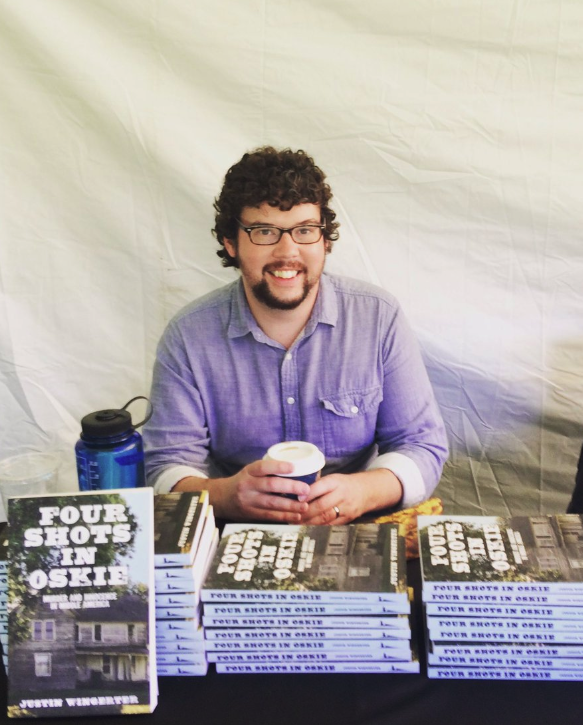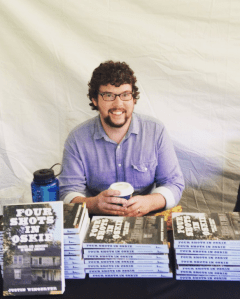Faced with subpoena, local journalist turns to RCFP’s free legal hotline for help

On July 28, 2021, Justin Wingerter logged into the federal court records website to check the docket of a case the journalist says he’s been obsessed with for years — a wrongful conviction that became the subject of a book he published just a few months earlier: “Four Shots in Oskie: Murder and Innocence in Middle America.”
Despite having just published a book about it, Wingerter, then a reporter for the Denver Post, says he liked to keep an eye on any legal developments in the case. What he didn’t expect to find that day, however, was a government filing indicating that “I was about to be subpoenaed.”

According to the document filed by the Kansas Attorney General’s Office on July 22, the government planned to demand all of Wingerter’s notes, recordings, research — “essentially everything I have on the book,” he said, as well as materials he used to report a 2016 investigative series on the case for the Topeka Capital-Journal.
The filing startled Wingerter, who understood the significance of what the government was after. The journalist’s book relied heavily on confidential sources and police records in order to chronicle the troubling story of how prosecutors in Oskaloosa, Kansas, ended up wrongfully convicting Floyd Bledsoe of murdering 14-year-old Camille Arfmann in 1999 — even after Bledsoe’s brother had confessed to the murder.
A subpoena “would have helped them find out who spoke to me for the book, and that’s very troubling,” Wingerter said. “People agreed to talk with me under complete confidence that I would always keep their name out of it, and that they would not face repercussions for talking to me. I made that promise to them, and this would have violated that promise.”
Wingerter knew he needed legal support to fend off the pending subpoena, which the government had not yet served to him. The same day he noticed the government’s legal filing, he contacted two private law firms, as well as the free legal hotline operated by the Reporters Committee for Freedom of the Press.
The two law firms never responded, Wingerter says. But Sarah Matthews, a senior staff attorney for the Reporters Committee, called back within a couple of hours. “Remarkably fast,” he said.
Wingerter says he explained the situation to Matthews, and she immediately came up with a strategy to respond to the subpoena.
“She was terrific. She more or less told me, ‘Here’s what’s going to happen in the next couple of days, and here’s how we’re going to address it,’” Wingerter said, adding that he quickly filed paperwork to accept Matthews as his attorney. “We were fully prepared, and I had full confidence that she was going to beat this thing in court.”
But instead, he said, “maybe we beat it in the media.”
Indeed, as Wingerter and Matthews were strategizing, local news outlets in Kansas learned of the government’s plans to demand the journalist’s records. They interviewed both Wingerter and Matthews, who expressed serious concerns about the pending subpoena and vowed to fight it. Shortly after those stories were published, the office of Kansas Attorney General Derek Schmidt withdrew the subpoena notice.
In a statement, John P. Milburn, a spokesman for the office, said that the notice “was filed without Attorney General Schmidt’s knowledge or approval. After learning of it this morning, Attorney General Schmidt expressed his disapproval and has directed that the notice be withdrawn and the subpoena not be issued.”
The news came as a huge relief — and surprise — to Wingerter, who had braced himself for a big legal battle. “To nip it in the bud that early is best for everybody,” he said. “But it should not have even reached this point.”
Even though he didn’t have to fight the subpoena in court, Wingerter says the legal advice he received from Matthews “meant the world to me,” and he encourages other journalists to take advantage of the free legal hotline for help.
“You can’t beat the response time, the knowledge, the advice, the willingness to take this on, and to do it pro bono, you can’t beat that,” Wingerter said. “If you’re a reporter at a local news outlet, you’re not exactly flush with cash. So to have that option is a game-changer, and it does make you feel like you can take on big forces like governments and win. That gives you freedom to pursue [stories], that gives you the freedom to stand up and to not be afraid, and that is a tremendous resource.”
For more information about when journalists and media lawyers should use the legal hotline — and what they should expect when they do — check out this Reporters Committee blog post.
This work was made possible by the Facebook Journalism Project and other donors.